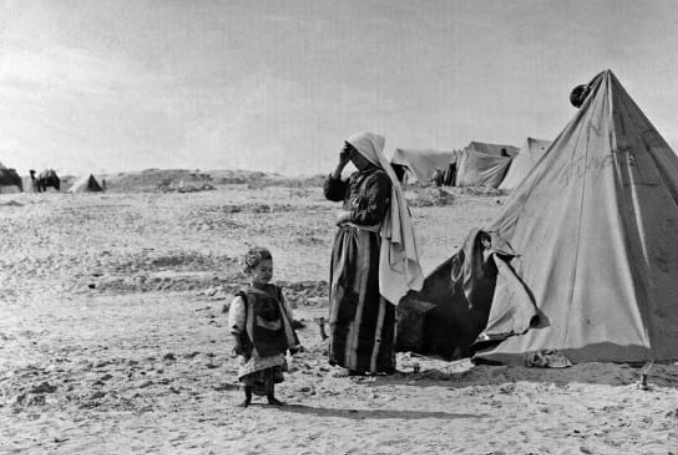
By Benay Blend
Yes, Israel has been a colonial regime for the past 70 years. Founded in 1948 through the displacement of nearly 800,000 Palestinians and the destruction of more than 530 towns and villages, this premeditated ethnic cleansing, known as al-Nakba, the catastrophe, was the prelude to a regime of settler colonialism, apartheid and occupation over the Palestinian people.
But while Israel has been a settler-colonial enterprise since 1948, it is not the only remaining one. Indeed, the United States currently engages in 21-century wars and occupations abroad, while at the same time waging war on indigenous and working people at home. This article focuses on how the history of both countries is the history of settler-colonialist societies. In turn, how might acknowledge this reality work to transform these two respective countries?
Writing in Haaretz shortly after the recent elections, Gideon Levy called Israel the “last colonial regime in the world.” No longer taking refuge in subterfuge, Levy explains, Israel has now removed the veil of deception to reveal Benjamin Netanyahu’s new government that is in fact, says Levy, an extension of the old one, but increasingly more nationalist and racist.
Moreover, he concludes, the new incarnation is much more attuned with reality: increasing censorship of the news; total crackdown on Boycott, Divestment and Sanctions (BDS); exclusion of Palestinians from political participation; and entry denial to critics of the current government. Finally, he predicts that annexations of Occupied Palestinian territories will continue at a rapid pace.
On the other hand, Levy believes that it is better to have ripped the veil. With no illusions left, denial might also become a thing of the past. Haaretz neglected to carry a post-election obituary, he laments but concludes perhaps it was for the best.
For Robert Fisk, speaking for those who saw through the hasbara (propaganda), Israel has never been a democracy, so no obituary needed. It is the disinformation, he says, that will crumble, not the state. As for future annexations, Fisk explains that those lands have already been transformed. Moreover, he holds all Israelis responsible for “sacrific[ing] their souls to Bibi,” a move that also means that “propaganda,” “excuses,” and “camouflage” are also dead.
Moreover, as Ramona Wadi claims after the far-right candidate vanished from the race, Israel’s political right is free to continue its settler-colonial agenda, which, for Wadi, is really the core of the story. Indeed, Wadi claims that far-right politics have become so “normalized” that they have escaped censure.
She notes as examples an allegedly humorous campaign video in which the current justice minister, Ayelet Shaked, of the settler-allied New Right party, sprays herself with a perfume labeled “Fascism.” Not to be outdone, Oren Hazan, a legislator in the Likud party, stars in a similar video in which he rises from a bubble bath to shoot a facsimile of a prominent Israeli-Palestinian politician.
The crux of Wadi’s argument is a warning not to let the discussion of Israel’s right-wing politics, which have been normalized in society for the past several years, eclipse the country’s long-held settler-colonial violations. As political focus moves to what trends are inherent in Israel’s recent election, Wadi laments that discussion inevitably shifts away from the root of the so-called “conflict”: that would be what Palestinians describe as an ongoing Nakba, a history of violations that go back to 1948.
Indeed, Wadi explains that if Israel is continuing to carry out is the original agenda—“that of establishing its colonial presence over the entirety of historic Palestine”—then overshadowing that violation by focusing on whether Israel is no longer an (alleged) democracy enables the Zionist state to continue on its way to expand over the entirety of historic Palestine.
As the Nakba approaches, Wadi’s final words are important.
Here she explains:
“While there is no denying a far-right trend in Israel, it is imperative that there is no dissociation between the continued violent, racist politics, and Zionist colonization.”
If this is omitted, Israel will have won additional impunity for its earlier violence, while the current violations will be dismissed from the colonial context, regardless of who emerges as the victor in the forthcoming elections.
Does this mean, though, that Israel is really the last colonial regime in the world? I’m not sure that most Native Americans, African Americans, Puerto Ricans, and others who live under 21st Century Settler Colonialism rule would agree.
In an interview with Roxanne Dunbar-Ortiz, author of Indigenous Peoples’ History of the United States (2014), David Barsamian asks how the history of the United States is a history of settler-colonialism (which I contend above is also the history of Israel).
Her answer was:
“The land is the body of the native people. The land as a body is monetized, capitalized. As is the African body. Not just African labor. That’s only half of it. It’s the human body. Land conquest and chattel slavery are so interlinked that if you separate them, you end up with a distorted story. And that interlink has to be at the core of a complete revision of U.S. history.”
This answer could also be applied to Israel’s unsuccessful attempts to sever Palestinians’ close attachment to the land. Similar to Israel’s true colonial nature now coming into view, Dunbar-Ortiz explains that our view of U.S. history as one of “progress toward greater freedom” is, in reality, an illusion.
No longer “suppressed by liberalism and all,” Standing Rock and the Lakota resistance can be seen, she explains, as a continuation of past resistance, just as Gazans have continued their resistance through the year-long Great Return March.
Dunbar ends the Indigenous Peoples’ History by envisioning a “radically reconfigured” continent, an outcome requiring, she asserts, “the full support and active participation of the descendants of settlers, enslaved Africans, and colonized Mexicans, as well as immigrant populations”.
In his proposal for “ethical decolonization,” Omar Barghouti maps a similar path where the settler-colonial population abandons their colonial privilege through joining in a common struggle with the indigenous community to determine a more equitable future for the state.
– Benay Blend received her doctorate in American Studies from the University of New Mexico. Her scholarly works include Douglas Vakoch and Sam Mickey, Eds. (2017), “’Neither Homeland Nor Exile are Words’: ‘Situated Knowledge’ in the Works of Palestinian and Native American Writers”. She contributed this article to The Palestine Chronicle.

– Benay Blend earned her doctorate in American Studies from the University of New Mexico. Her scholarly works include Douglas Vakoch and Sam Mickey, Eds. (2017), “’Neither Homeland Nor Exile are Words’: ‘Situated Knowledge’ in the Works of Palestinian and Native American Writers”. She contributed this article to The Palestine Chronicle.








